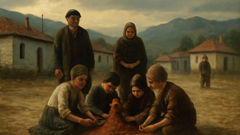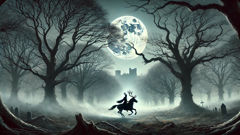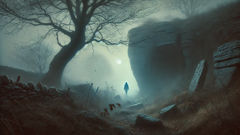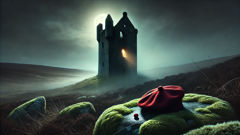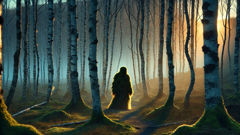Introduction
In the rolling green heart of the Balkan Mountains, where mists coil around pine and beech forests and village roofs cluster like red shells among wildflower meadows, the seasons have always ruled with a stern but just hand. Summer brings fierce sun, crisping the wheat and setting vineyards aglow, while winter lays a thick white silence over every stone and path. Yet, it is spring and its capricious rains that truly shape the fate of Bulgaria’s countryside. There, in the 19th century, the people of remote hamlets depended on the sky’s mercy. Fields of rye and barley, garden patches of beans, and corn all waited, sometimes in vain, for the blessing of rain. It was during one such year, when the clouds turned away and the rivers shrank to a trickle, that an ancient ritual was revived: the German. Not a foreigner, as one might first imagine, but a clay figure—a doll molded by children’s hands, fated to be mourned and buried in a plea to the heavens. Whispers of this ritual drifted from village to village, carrying both hope and old fear, for its origins were tangled in mystery, its outcome never certain. The story of the German isn’t just a tale of a forgotten superstition. It is the story of a community’s unity and longing, of children given a sacred task, of songs sung to empty skies, and of the fragile, unbreakable bond between people and the earth. In the shadow of the Stara Planina mountains, where wild thyme scents the air and sheepbells echo over ridges, one small village faced the drought with hearts full of memory and trembling resolve. There, a young girl named Elenka would discover her own place in the ancient cycle, leading her friends into the ritual’s dark heart—where sorrow mingled with hope, and clay became the vessel for all their dreams of rain.
When the Sky Refused to Weep
The summer drought crept into the village of Dobrusha as quietly as a shadow at dusk. It started with missed morning dews—the grass dry beneath bare feet, the air no longer fresh but already warm when the first rooster crowed. Wells that had gurgled cheerfully all spring now required a bucket to be dropped deeper each day. Women whispered in the breadline about cracks zigzagging across their gardens, and men stood by their oxen, hats in hand, staring at the wilting rye with stoic dread. Cattle wandered restlessly, kicking up yellow dust, and even the storks seemed to fly a little higher, wings flickering against a sky that no longer promised rain.
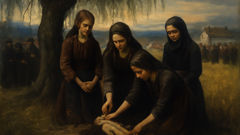
Elenka noticed the drought in small, sharp ways: her mother’s pinched voice when washing clothes in barely enough water, her father’s silence as he returned from the fields empty-handed, and her own garden plot—a patch she’d planted with broad beans—shrinking with every sunrise. It was her grandmother, Baba Mariika, who first mentioned the old ritual, her voice low and uncertain over a bowl of sour cherry compote one evening. “When I was a girl,” she said, eyes distant, “the sky dried up for weeks. The village elders asked us children to make the German. We mourned him like a real soul. The rain came after.”
Stories spread swiftly in Dobrusha. Soon, other children were listening to their own grandparents, piecing together fragments of folklore: the German must be shaped from river clay, dressed in simple rags, with pebbles for eyes and a cross made of twigs. He must be carried by girls alone, with songs both sad and pleading, before being buried beneath a willow or at a crossroads. The ritual was old as memory and tinged with awe. Some villagers muttered about pagan sorcery, while others clung to it as their last hope.
One hot afternoon, Elenka gathered her friends—Milena with her wild curls, stoic Todora, and little Yana—and led them to the shrinking banks of the nearby stream. Their hands sunk into the cool, sticky clay, shaping and patting, smoothing limbs and a featureless face. They gave the German a crown of grass and a belt of faded red thread, then set him carefully in a woven basket lined with scraps. The older women watched from doorways, lips moving in silent prayers.
As dusk settled, the children—dressed in white shifts, wreaths of cornflowers on their heads—walked in slow procession through the village. Their voices rose in a plaintive chant:
“Germancho, Germancho,
Give us rain,
Let the fields drink,
Let our mothers bake bread again.”
The men stood back, hats pressed to their chests, faces lined with worry. The children circled the well, then moved on, their song drifting over empty fields. When they reached the willow by the old road, Elenka’s voice quavered but did not break. She knelt, digging a shallow grave in the thirsty earth. The German was placed inside, the girls’ hands trembling as they covered him with soil. Yana sobbed openly; Milena squeezed Elenka’s hand. They knelt in mourning, singing a lament older than memory. For a moment, the air felt charged—strange and expectant.
That night, thunder grumbled far off in the mountains. The villagers listened in silence, daring not to hope. The ritual was done; now, all they could do was wait.
Mourning and Memory
The days that followed the burial of the German were thick with anticipation and unease. Elenka woke each morning to find her mother already at the window, searching the pale sky for any sign of darkening clouds. The air was still—too still. The world seemed to hold its breath. Villagers walked softer, voices hushed as if not to disturb the fragile hope they’d planted with the clay figure beneath the willow.
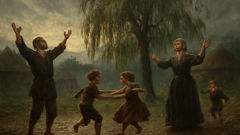
For the children, life became strangely sacred. Each day after chores, Elenka and her friends visited the German’s grave. Sometimes they brought wildflowers or left a slice of bread. They sang the ritual songs, softer now, their voices trembling in the silent heat. The German had become more than a doll—he was a secret friend, a vessel for all their worry and longing. The girls felt both proud and burdened by their role; they had carried out the ritual, but what if it failed? What if they had not sung right, or the grave was too shallow? Their fears mingled with the unspoken anxieties of their elders.
In the evenings, the entire village gathered in the square to share news and rumors. An old shepherd claimed he’d heard the river sighing as if it wept for rain. Baba Mariika swore she saw a stork drop a feather near the German’s grave—a sign, she insisted, that the spirits had heard the children’s plea. Some men grew restless, muttering that they should fetch a priest to bless the fields instead of relying on old pagan magic. But most were caught in that space between faith and desperation, unwilling to offend any power that might bring rain.
One sultry night, Elenka dreamed of the German. In her dream, he rose from his clay grave, not as a doll but as a slender youth wrapped in green shoots and wildflowers. His voice was soft as rain on new leaves. “You must trust the earth,” he told her. “All things turn in their time.” When she awoke, the dream felt as real as the weight of dust on her windowsill. She told her grandmother, who only nodded, her eyes bright with unspoken knowledge.
Days stretched into weeks. The drought persisted. The riverbed cracked and shimmered in the sun; cattle grew gaunt. The villagers’ initial hope gave way to sullen resignation. Some began to avoid the willow altogether, fearing that they had angered the spirits or performed the ritual wrong. But Elenka clung to her dream and to her friends. They continued their mourning, now joined by a few more children who brought their own stories and sorrows. They wove songs of longing and comfort, their voices weaving through the heat like a slender thread of hope.
And then, one afternoon, while Elenka and Milena sat beneath the willow weaving wreaths from brittle grass, a breeze stirred the branches. The sky to the west had darkened—slowly, almost imperceptibly, clouds began to gather. It was as if the world itself was waking from a long sleep. The village tensed. Could it be real? Or just another false promise? The girls ran through the streets, calling to everyone: “Look! The clouds are coming!”
That night, as thunder rolled across the ridges and the first fat drops spattered the dry ground, the entire village poured into the square. Some laughed, others wept openly. Children danced barefoot in the mud, and women lifted their aprons to the sky in thanks. Elenka stood by the willow, her heart bursting with gratitude and awe. The German’s grave was crowned with wildflowers, shining wet in the rain. The ritual, it seemed, had worked—not by magic alone, but through the unity and longing of an entire village joined in hope.
Conclusion
Long after that summer, the story of the German lived on in Dobrusha and neighboring villages—a memory passed from grandparent to grandchild each time the sky threatened drought. The ritual became less about superstition and more a symbol of hope, resilience, and the enduring ties between people and land. Elenka grew up and taught her own children how to shape clay and sing to the sky—not because she believed the doll alone could summon rain, but because she knew that belief itself held power. The German’s legend reminds us: sometimes, the act of coming together in sorrow and hope can change the world, if only by making it more bearable until mercy comes at last.

